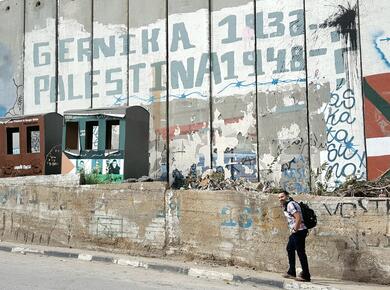Posted: April 10, 2024
“There should be justice. They should pay for the terrible wrong they have done.” These and other similar phrases have been repeated in the news in recent months.
In my country, Colombia, I have heard the same sentences too many times on the lips of Christians who claim to follow Jesus, the God who chose compassion over retaliation, the one who taught us to give to our enemies and even oppressors, not what they deserve but what they need.
While I reflect on the images of the atrocities caused by the war in uncountable places in the world, I remember the words of a wise Jewish rabbi, Jonathan Sacks, who served as Chief Rabbi of the United Hebrew Congregations of the Commonwealth from 1991 to 2013. Let me quote some of his writings here:
“It is our task [of the Abrahamic faith] to be a blessing to the world.... To invoke God to justify violence against the innocent is not an act of sanctity but of sacrilege. It is a kind of blasphemy. It is to take God’s name in vain.”1
“Nothing is more dispiriting than the cycle of revenge that haunts conflict zones and traps their populations into a past that never relaxes its grip. That has been the fate of the Balkans, Northern Ireland, India and Kashmir, the Middle East.... Retaliation is the instinctual response to perceived wrong.… Historic grievances are rarely forgotten. They become part of a people’s collective memory…. It is this that makes forgiveness so counterintuitive an idea. It is more than a technique of conflict resolution. It is a stunningly original strategy. In a world without forgiveness, evil begets evil, harm generates harm, and there is no way short of exhaustion or forgetfulness of breaking the sequence. Forgiveness breaks the chain.”2
Rabbi Sacks observes – as does anyone who has considered the conflict in Israel-Palestine – that the issues are complex. It would have been implemented if it had been simple to find a solution acceptable to the major parties.
There are long memories involved: Israelis think about “2,000 years of Jewish suffering and the existential need for Jews to have, somewhere on earth, defensible space,” Rabbi Sacks writes, and Palestinians remember “displacement and loss, political impotence and economic hardship, of humiliating defeat and anger.”3
As each group attempts to protect their own space, their attempts to secure it sometimes result in harm that affects the other and turns back on themselves. “Forgiveness seems absurdly inadequate to substantive conflicts of interest and the sheer momentum of suspicion, distrust and cumulative grievance,” Rabbi Sacks writes.
“Yet in the end peace is made, if at all, then by people who acknowledge the personhood of their opponents. Until Israelis and Palestinians are able to listen to one another, hear each other’s anguish and anger and make cognitive space for one another’s hopes, there is no way forward [… As a Jew] I honour the past not by repeating it but by learning from it – by refusing to add pain to pain, grief to grief. That is why we must answer hatred with love, violence with peace, resentment with generosity of spirit and conflict with reconciliation.”4
As I write these words, the cycle of violence and retaliation continues to deepen. It is almost impossible to say anything about that situation without angering someone somewhere, as was the case with the Reconciling response to war in the Middle East statement we wrote in October 2023. And yet, we are called to respond, as a Global Communion, to this and many other terrible scenarios of war we see today. That is why we invite you, in this issue of Courier, to reflect on understanding biblical messages in terms of today’s realities.
Yes, amid terrible atrocities, people, whoever they are, have the right to demand that the perpetrators get what they deserve for what they have done. But, thanks to God, it does not have to be that way. Thanks to God, Jesus shows us another way.
—César García is general secretary of Mennonite World Conference. Originally from Colombia, he lives in Kitchener, Ontario, Canada.
1. Not in God’s Name, 5.
2. The Dignity of Difference, 178-79.
3. Ibid., 189-190.
4.Ibid., 189-190.
Bibliography
-
Sacks, Jonathan. The Dignity of Difference: How to Avoid the Clash of Civilizations. London: Bloomsbury, 2003.
-
———. Not in God’s Name: Confronting Religious Violence. First American edition. ed. New York: Schocken Books, 2015.



Comments: